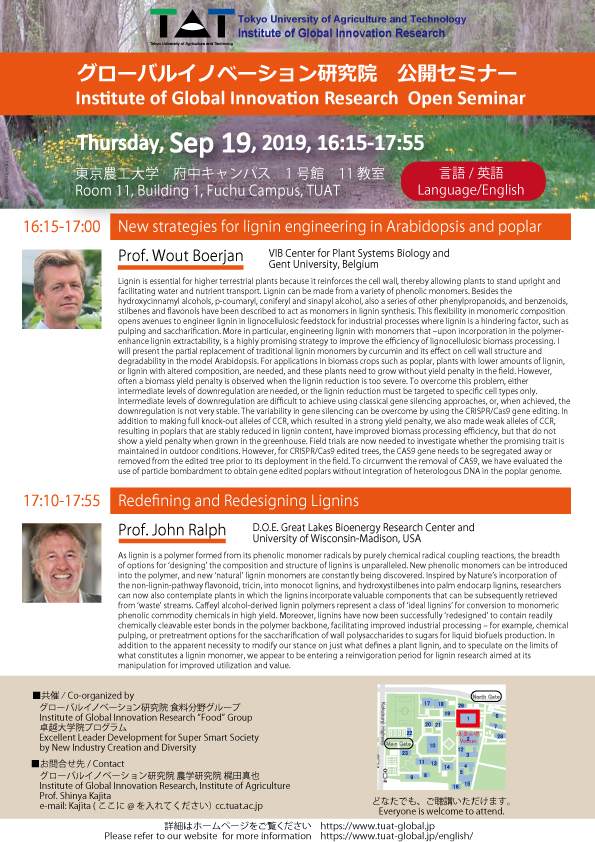イベント情報
【GIR公開セミナー】Prof. Wout Boerjan/Prof. John Ralph

| 日時 | 2019.9.19(16:15~17:55) |
|---|---|
| 会場 | |
| 講演タイトル | 16:15-17:00 講演者 Prof. Wout Boerjan VIB Center for Plant Systems Biology and Gent University (ベルギー) 講演タイトル New strategies for lignin engineering in Arabidopsis and poplar 要旨 Lignin is essential for higher terrestrial plants because it reinforces the cell wall, thereby allowing plants to stand upright and facilitating water and nutrient transport. Lignin can be made from a variety of phenolic monomers. Besides the hydroxycinnamyl alcohols, p-coumaryl, coniferyl and sinapyl alcohol, also a series of other phenylpropanoids, and benzenoids, stilbenes and flavonols have been described to act as monomers in lignin synthesis. This flexibility in monomeric composition opens avenues to engineer lignin in lignocellulosic feedstock for industrial processes where lignin is a hindering factor, such as pulping and saccharification. More in particular, engineering lignin with monomers that –upon incorporation in the polymer- enhance lignin extractability, is a highly promising strategy to improve the efficiency of lignocellulosic biomass processing. I will present the partial replacement of traditional lignin monomers by curcumin and its effect on cell wall structure and degradability in the model Arabidopsis. For applications in biomass crops such as poplar, plants with lower amounts of lignin, or lignin with altered composition, are needed, and these plants need to grow without yield penalty in the field. However, often a biomass yield penalty is observed when the lignin reduction is too severe. To overcome this problem, either intermediate levels of downregulation are needed, or the lignin reduction must be targeted to specific cell types only. Intermediate levels of downregulation are difficult to achieve using classical gene silencing approaches, or, when achieved, the downregulation is not very stable. The variability in gene silencing can be overcome by using the CRISPR/Cas9 gene editing. In addition to making full knock-out alleles of CCR, which resulted in a strong yield penalty, we also made weak alleles of CCR, resulting in poplars that are stably reduced in lignin content, have improved biomass processing efficiency, but that do not show a yield penalty when grown in the greenhouse. Field trials are now needed to investigate whether the promising trait is maintained in outdoor conditions. However, for CRISPR/Cas9 edited trees, the CAS9 gene needs to be segregated away or removed from the edited tree prior to its deployment in the field. To circumvent the removal of CAS9, we have evaluated the use of particle bombardment to obtain gene edited poplars without integration of heterologous DNA in the poplar genome. 17:10-17:55 講演者 Prof. John Ralph D.O.E. Great Lakes Bioenergy Research Center and University of Wisconsin-Madison(米国) 講演タイトル Redefining and Redesigning Lignins 要旨 As lignin is a polymer formed from its phenolic monomer radicals by purely chemical radical coupling reactions, the breadth of options for ‘designing’ the composition and structure of lignins is unparalleled. New phenolic monomers can be introduced into the polymer, and new ‘natural’ lignin monomers are constantly being discovered. Inspired by Nature’s incorporation of the non-lignin-pathway flavonoid, tricin, into monocot lignins, and hydroxystilbenes into palm endocarp lignins, researchers can now also contemplate plants in which the lignins incorporate valuable components that can be subsequently retrieved from ‘waste’ streams. Caffeyl alcohol-derived lignin polymers represent a class of ‘ideal lignins’ for conversion to monomeric phenolic commodity chemicals in high yield. Moreover, lignins have now been successfully ‘redesigned’ to contain readily chemically cleavable ester bonds in the polymer backbone, facilitating improved industrial processing – for example, chemical pulping, or pretreatment options for the saccharification of wall polysaccharides to sugars for liquid biofuels production. In addition to the apparent necessity to modify our stance on just what defines a plant lignin, and to speculate on the limits of what constitutes a lignin monomer, we appear to be entering a reinvigoration period for lignin research aimed at its manipulation for improved utilization and value. |
| 言語 | 英語 |
| 対象 | どなたでも、ご聴講いただけます。 |
| 共催 | グローバルイノベーション研究院 食料分野グループ 卓越大学院プログラム |
| 開催概要 | |
| お問い合わせ窓口 | グローバルイノベーション研究院 農学研究院 梶田真也 e-mail: Kajita ( ここに@ を入れてください) cc.tuat.ac.jp |
このページの上部へ